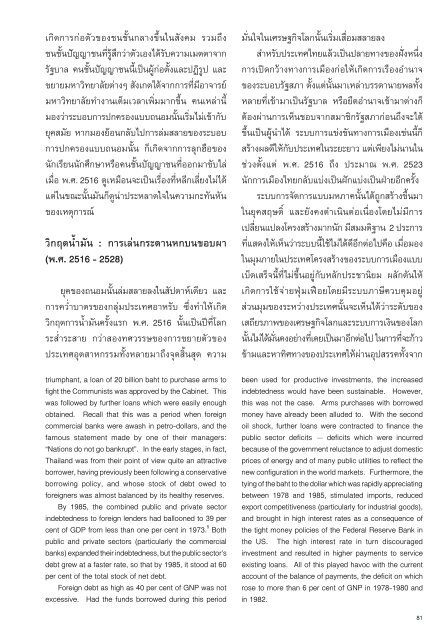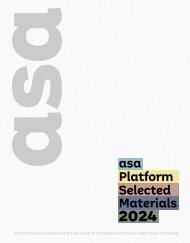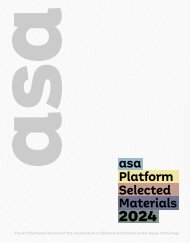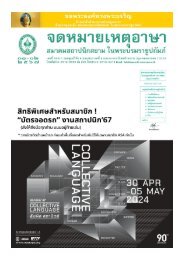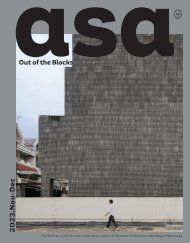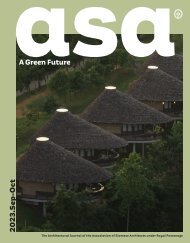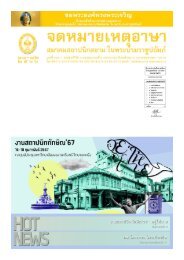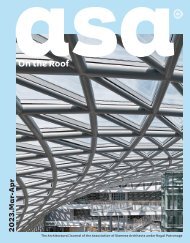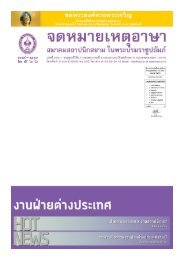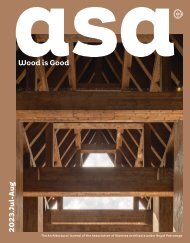บ้านเรือนถิ่นไทยในช่วงเจ็ดทศวรรษ 2489-2559
Create successful ePaper yourself
Turn your PDF publications into a flip-book with our unique Google optimized e-Paper software.
เกิดการก่อตัวของชนชั้นกลางขึ้นในสังคม รวมถึง<br />
ชนชั้นปัญญาชนที่รู้สึกว่าตัวเองได้รับความเมตตาจาก<br />
รัฐบาล คนชั้นปัญญาชนนี้เป็นผู้ก่อตั้งและปฏิรูป และ<br />
ขยายมหาวิทยาลัยต่างๆ สังเกตได้จากการที่มีอาจารย์<br />
มหาวิทยาลัยทำงานเต็มเวลาเพิ่มมากขึ้น คนเหล่านี้<br />
มองว่าระบอบการปกครองแบบถนอมนั้นเริ่มไม่เข้ากับ<br />
ยุคสมัย หากมองย้อนกลับไปการล่มสลายของระบอบ<br />
การปกครองแบบถนอมนั้น ก็เกิดจากการลุกฮือของ<br />
นักเรียนนักศึกษาหรือคนชั้นปัญญาชนที่ออกมาขับไล่<br />
เมื่อ พ.ศ. 2516 ดูเหมือนจะเป็นเรื่องที่หลีกเลี่ยงไม่ได้<br />
แต่ในขณะนั้นมันก็ดูน่าประหลาดใจในความกะทันหัน<br />
ของเหตุการณ์<br />
วิกฤตน้ำมัน : การเล่นกระดานหกบนขอบผา<br />
(พ.ศ. 2516 - 2528)<br />
ยุคของถนอมนั้นล่มสลายลงในสัปดาห์เดียว และ<br />
การคว่ำบาตรของกลุ่มประเทศอาหรับ ซึ่งทำให้เกิด<br />
วิกฤตการน้ำมันครั้งแรก พ.ศ. 2516 นั้นเป็นปีที่โลก<br />
ระส่ำระสาย กว่าสองทศวรรษของการขยายตัวของ<br />
ประเทศอุตสาหกรรมทั้งหลายมาถึงจุดสิ้นสุด ความ<br />
triumphant, a loan of 20 billion baht to purchase arms to<br />
fight the Communists was approved by the Cabinet. This<br />
was followed by further loans which were easily enough<br />
obtained. Recall that this was a period when foreign<br />
commercial banks were awash in petro-dollars, and the<br />
famous statement made by one of their managers:<br />
“Nations do not go bankrupt”. In the early stages, in fact,<br />
Thailand was from their point of view quite an attractive<br />
borrower, having previously been following a conservative<br />
borrowing policy, and whose stock of debt owed to<br />
foreigners was almost balanced by its healthy reserves.<br />
By 1985, the combined public and private sector<br />
indebtedness to foreign lenders had ballooned to 39 per<br />
cent of GDP from less than one per cent in 1973. 5 Both<br />
public and private sectors (particularly the commercial<br />
banks) expanded their indebtedness, but the public sector’s<br />
debt grew at a faster rate, so that by 1985, it stood at 60<br />
per cent of the total stock of net debt.<br />
Foreign debt as high as 40 per cent of GNP was not<br />
excessive. Had the funds borrowed during this period<br />
มั่นใจในเศรษฐกิจโลกนั้นเริ่มเสื่อมสลายลง<br />
สำหรับประเทศไทยแล้วเป็นปลายทางของฝั่งหนึ่ง<br />
การเปิดกว้างทางการเมืองก่อให้เกิดการเรืองอำนาจ<br />
ของระบอบรัฐสภา ตั้งแต่นั้นมาเหล่าบรรดานายพลทั้ง<br />
หลายที่เข้ามาเป็นรัฐบาล หรือยึดอำนาจเข้ามาต่างก็<br />
ต้องผ่านการเห็นชอบจากสมาชิกรัฐสภาก่อนถึงจะได้<br />
ขึ้นเป็นผู้นำได้ ระบบการแข่งขันทางการเมืองเช่นนี้ก็<br />
สร้างผลดีให้กับประเทศในระยะยาว แต่เพียงไม่นานใน<br />
ช่วงตั้งแต่ พ.ศ. 2516 ถึง ประมาณ พ.ศ. 2523<br />
นักการเมืองไทยกลับแบ่งเป็นฝักแบ่งเป็นฝ่ายอีกครั้ง<br />
ระบบการจัดการแบบมหภาคนั้นได้ถูกสร้างขึ้นมา<br />
ในยุคสฤษดิ์ และยังคงดำเนินต่อเนื่องโดยไม่มีการ<br />
เปลี่ยนแปลงโครงสร้างมากนัก มีสมมติฐาน 2 ประการ<br />
ที่แสดงให้เห็นว่าระบบนี้ใช้ไม่ได้ดีอีกต่อไปคือ เมื่อมอง<br />
ในมุมภายในประเทศโครงสร้างของระบบการเมืองแบบ<br />
เบ็ดเสร็จนี้ที่ไม่ขึ้นอยู่กับหลักประชานิยม ผลักดันให้<br />
เกิดการใช้จ่ายฟุ่มเฟือยโดยมีระบบภาษีควบคุมอยู่<br />
ส่วนมุมของระหว่างประเทศนั้นจะเห็นได้ว่าระดับของ<br />
เสถียรภาพของเศรษฐกิจโลกและระบบการเงินของโลก<br />
นั้นไม่ได้มั่นคงอย่างที่เคยเป็นมาอีกต่อไป ในการที่จะก้าว<br />
ข้ามและหาทิศทางของประเทศให้ผ่านอุปสรรคทั้งจาก<br />
been used for productive investments, the increased<br />
indebtedness would have been sustainable. However,<br />
this was not the case. Arms purchases with borrowed<br />
money have already been alluded to. With the second<br />
oil shock, further loans were contracted to finance the<br />
public sector deficits – deficits which were incurred<br />
because of the government reluctance to adjust domestic<br />
prices of energy and of many public utilities to reflect the<br />
new configuration in the world markets. Furthermore, the<br />
tying of the baht to the dollar which was rapidly appreciating<br />
between 1978 and 1985, stimulated imports, reduced<br />
export competitiveness (particularly for industrial goods),<br />
and brought in high interest rates as a consequence of<br />
the tight money policies of the Federal Reserve Bank in<br />
the US. The high interest rate in turn discouraged<br />
investment and resulted in higher payments to service<br />
existing loans. All of this played havoc with the current<br />
account of the balance of payments, the deficit on which<br />
rose to more than 6 per cent of GNP in 1978-1980 and<br />
in 1982.<br />
81


